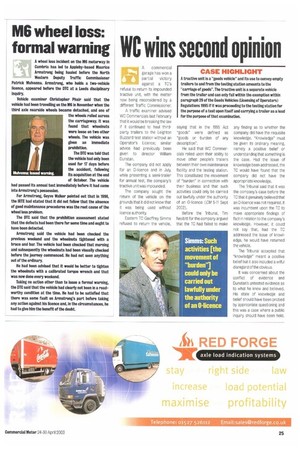A commercial garage has won a partial victory against a
Page 25

If you've noticed an error in this article please click here to report it so we can fix it.
TC's refusai to return its impounded tractive unit, with the matter now being reconsidered by a different Traffic Commissioner.
A traffic examiner advised WC Commercials last February that it would be breaking the law if it continued to haul thirdparty trailers to the Leighton Buzzard test station without an Operator's Licence; similar advice had previously been given to director William Dunstan.
The company did not apply for an 0-licence and in July, while presenting a semi-trailer for annual test, the company's tractive unit was impounded.
The company sought the return of the vehicle on the grounds that it did not know that it was being used without licence authority.
Eastern TO Geoffrey Simms refused to return the vehicle, saying that in the 1995 Act "goods" were defined as "goods or burden of any description".
He said that WC Commercials relied upon their ability to move other people's trailers between their own maintenance facility and the testing station. This constituted the movement of 'burden" in connection with the r business and that such activities could only be carried out lawfully under the authority of an 0-licence (CM 5-11 Sept 2002).
Before the Tribunal, Tim Nesbitt for the company argued that the TO had failed to make any finding as to whether the company did have the requisite knowledge. "Knowledge" must be given its ordinary meaning, namely a positive belief or understanding that something is the case. Had the issue of knowledge been addressed, the TC would have found that the company did not have the appropriate knowledge.
The Tribunal said that it was the company's case before the TO that it genuinely believed that an 0-licence was not required. It was incumbent upon the TO to make appropriate findings of fact in relation to the company's knowledge. However, it couid not say that, had the TO addressed the issue of knowledge, he would have returned the vehicle.
The Tribunal accepted that "knowledge" meant a positive belief but it also included a wilful disregard of the obvious.
It was concerned about the conflict of evidence and Dunstan's untested evidence as to what he knew and believed. His state of knowledge and belief should have been probed by appropriate questioning and this was a case where a public inquiry should have been held.
































































































































































